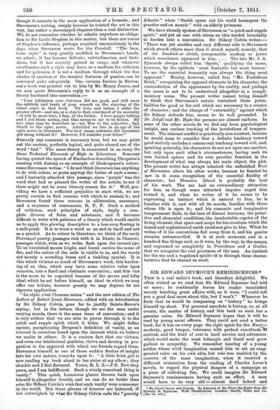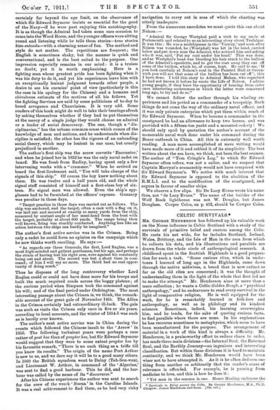SIR EDWARD SEYMOUR'S REMINISCENCES.* THIS is a real sailor's book,
and therefore delightful. We often wished as we read that Sir Edward Seymour bad told us more ; he continually leaves his reader unsatisfied merely touching great affairs with, as it were, "I could tell you a good deal more about this, but I won't." Wherever he feels that he would be trespassing on " history " be brings himself up short. Yet personal anecdote is history, or, at all events, the matter of history, and this book 'as such has a genaine value. Sir Edward Seymour hopes that it will be read by young naval officers. They could not read a better book, for it has on every page the right spirit for the Navy— modesty, good temper, tolerance with perfect exactitudeif outlook, and the kind of zest in hard service and adventure which would make the most lethargic and timid' soul grow gallant in sympathy. We remember hearing of a young soldier whose vivid imagination caused him to set an exag- gerated value on his own skin, but who was enabled by the exercise of the same imagination, when it received a different orientation from the reading of Charles Lever's novels, to regard the physical dangers of a campaign as a piece of rollicking fun. We could imagine Sir Edward Seymour's reminiscences having such an effect. A man would have to be very old — almost dead indeed and
• My Naval Career and Travels. By Admiral of the Fleet the Eight Hon. Sir Edward H. Seymour. With Illustrations. London : Smith, Elder and Co. 1108. 6d. net.]
certainly far beyond the age limit, on the observance of which Sir Edward Seymour insists as essential for the good of the Navy—if he were past enjoying this autobiography. It is as though the Admiral had taken some rare occasion to come into the Ward Room, and the younger officers were sitting round and listening while he tells them stories—true stories bier entendu—with a charming sense of fun. The method and
style do not matter. The repetitions are frequent ; the English is sometimes shaky, but the manner is quick and conversational, and is the best suited to the purpose. One impression especially remains in our mind : it is a truism no doubt, yet it is worth emphasizing. Here is a fighting man whose greatest pride has been fighting when it was his duty to do it, and yet his experiences leave him with an exceptionally lenient judgment towards other people, a desire to see his enemies' point of view (particularly is this the case in his apology for the Chinese) and a humane and chivalrous estimate of the motives of all his fellows. Yet the fighting Services are said by some politicians of to-day to breed arrogance and Chauvinism. It is very odd. Some readers of this book might do well to take their bearings afresh by asking themselves whether if they bad to put themselves at the mercy of a single judge they would choose an admiral or a leader of social democracy. The one, though a " dis- ciplinarian," has the urbane common sense which comes of the knowledge of men and nations, and he understands when dis- cipline is satisfied; the other has the rigours of an unbending social theory, which may be lenient in one case, but cruelly prejudiced in another.
The author's first ship was the screw corvette Encounter,' and when he joined her in 1852 he was the only naval cadet on board. He was fresh from Radley, having spent only a few intervening weeks with a "crammer." When he arrived on board the first-lieutenant said, "You will take charge of the signals of this ship." Of course the boy knew nothing about them. He was twelve and a half years old, and the whole signal staff consisted of himself and a first-class boy of six- teen. No signal man was allowed. Even the ship's spy- glasses had to be furnished at the officers' expense. Gunnery was peculiar in those days.
" Target practice in those days was carried out as follows. The ship was anchored, and the target, often a cask with a flag on it, was laid out and moored at exactly so many yards from the ship, measured by sextant angle of her mast-head from the boat with the target, probably at about 600 yards. The range being then well known, firing was steadily conducted. Anything less like an action between two ships can hardly be imagined."
The author's first active service was in the Crimea. Being only a cadet he could form no opinion on the campaign which he now thinks worth recalling. He says :—
" As regards our three Generals, the first, Lord Raglan, was a most high-minded and gallant gentleman, but his age, and perhaps the strain of having lost his right arm, were against his constantly being out and about. The second was but a short time in com- mand; of him I will say no more. The third had no real oppor- tunity of doing much."
Thus he disposes of the long controversy whether Lord Raglan could or could not have done more for his troops and built the much required roads across the boggy plateau ; of the curious period when Simpson took the command against his will ; and of the final period under Codrington. The most interesting passage about the Crimea is, we think, the remark- able account of the great gale of November llth. The Allies in the Crimea certainly had extraordinary ill-luck. The gale was such as visits the Crimea only once in five or six years, according to local accounts, and the winter of 1854-5 was such as is hardly ever known.
The author's next active service was in China during the
events which followed the Chinese insult to the ' Arrow ' in 1856. The following turbulent years were perhaps a case rather of post hoc than of propter hoc, but Sir Edward Seymour would suggest that they were to some extent propter hoc by his favourite remark, "There is no such thing as a trifle till
you know its results." The origin of the name Port Arthur is new to us, and we dare say it will be to a good many others.
In 1860 the British squadron went to Dalny (Tah-lien-wan), and Lieutenant W. Arthur, in command of the g.Algerine,' was sent to find a good harbour. This he did, and the har- bour was called by the name of its "discoverer."
After his Chinese experiences the author was sent to search for the crew of the wreck Noma in the Caroline Islands. It was a real achirvement to find them, as he had very risky navigation to carry out in seas of which the charting was utterly inadequate.
From the numerous anecdotes we must quote this one about Nelson :—
" Admiral Sir George Westphal paid a visit to my uncle at Portsmouth and related to us an interesting story about Trafalgar. It was this : He was a midshipman in the Victory,' and soon after Nelson was wounded, he (Westphal) was hit in the head, carried below and put down near the Admiral, who noticed him and asking who it was, said, Put my coat under his head.' This was done, and as Westphal's head was bleeding his hair stuck to the bullion of the Admiral's epaulette, and to get the coat away they mit off some of the bullion, which he, of course, kept. He said to me, If you look carefully at Nelson's coat in the Painted Hall at Green- wich you will see that some of the bullion has been cut off'; this I have done. I told this story to Admiral Mahan, who regretted he had not known it before he wrote the Life of Nelson. I advise young people, if they have the opportunity of hearing from older ones interesting ocourrences in which the latter were concerned long ago, to try and do so."
We cannot follow the author through his whaling ex- periences and his period as a commander of a troopship. Such things do not come the way of the ordinary naval officer, and it was only private enterprise which put them within reach of Sir Edward Seymour. When he became a commander in the coastguard he had an allowance to keep two horses, and was provided with a fifteen-ton yacht and a mounted orderly ! We should only spoil by quotation the author's account of the memorable naval work done under his command during the Boxer outbreak in China. All this is extremely well worth reading. A man more accomplished at mere writing would have made more of it and robbed it of its simplicity. The best writers about the sea have, we think, not been the best seamen. The author of " Tom Cringle's Log," to which Sir Edward Seymour often refers, was not a sailor, and we suspect that Captain Marryat's seamanship would not have compared with Sir Edward Seymour's. We notice with much interest that Sir Edward Seymour is opposed to the abolition of the R.M.L.L and to the modification of the coastguard, and argues in favour of smaller ships.
We observe a few slips. Sir De Lacy Evans wrote his name thus, not "de Lacy Evans." The name of the builder of the Wolf Rock lighthouse, was not W. Douglas, but James Douglass. Cooper Coles, on p. 412, should be Cowper Coles.































































 Previous page
Previous page